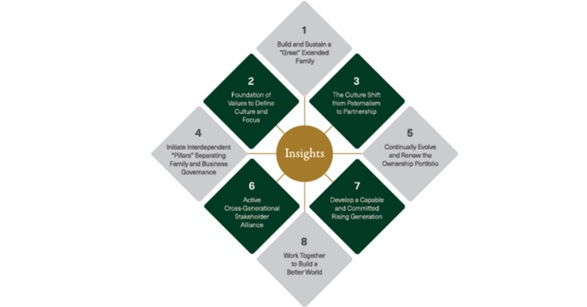- The personal and financial development of the next generation, also referred to as the rising generation, promotes responsible stewards of a family legacy.
- Connecting the family’s purpose of wealth and values to these financial skills is paramount to a successful wealth transfer.
- Working with your First Republic advisor can help your family navigate this time of growth and preparation to launch the rising generation.
Transferring financial wealth to the younger generation is an opportunity that families often anticipate with a mix of joy — and a hint of unease. On the one hand, a successful gift of family assets extends the values, purpose and legacy of the family to the next generation, also referred to as the rising generation. This can ensure continued financial stability, as well as create opportunities for family, business, career and philanthropy.
However, financial wealth can also introduce complexities. Family leaders often want reassurance that the younger generation is prepared to guide the family into the future. The rising generation may also have their own questions and uncertainties about what family resources mean for their life goals. By supporting financial education with wealth and life planning skills, families can help answer some of these questions and set the rising generation up for future success.
Readiness rooted in purpose
The process of learning financial skills provides a powerful way for the rising generation to connect their financial capabilities to the family’s purpose of wealth and values. Uncovering and understanding a family’s purpose of wealth provide the rising generation with a lens they can use to “thoughtfully align choices about the earning, saving, spending, investing and sharing of money with what matters most,” says Stacy Allred, who leads First Republic’s Family Engagement and Governance team. This becomes the compass for making decisions. For example, if a family determines that part of its purpose is to remain active and contribute to a specific community, then leveraging assets to help the rising generation purchase homes in that area, start local businesses or donate to community charities can help bring that purpose to life.
Building financial acumen for future growth
Children of wealth often want more education and information regarding personal and family finances. The transition into college provides a great opportunity to teach young adults about financial skills. The 10 x 10 Model for Building a Thriving and Connected Family of Wealth — developed by First Republic’s Family, Engagement and Governance team, in partnership with the Money, Meaning and Choices Institute — outlines the financial capabilities relevant at different life stages. Emerging and early adulthood, which spans ages 19 through 35, provides critical opportunities for learning about saving, managing assets and developing decision-making skills.
Learning financial skills in emerging adulthood
The related skills start with budget basics and build on that knowledge as the family members move through their careers and financial lives and prepare for independence. With this in mind, emerging adults — ages 19 through 25 — can choose to focus on the following:
- Develop skills to manage money away from home:
Create a budget for spending and saving while away at school or work and living away from the family home. - Track assets and progress:
Understand how to create and read a balance sheet and net worth statement and strategically use leverage in a disciplined fashion. - Purchasing or leasing a car:
Learn about loans, payments, insurance and maintenance costs. - Prepare for independence:
Focus and qualify for housing, start a career, and balance how to invest and pay bills and taxes. - Establish an IRA or Roth IRA for retirement saving:
With earned income, create a retirement-focused account, highlighting the importance of saving early with tax-advantaged vehicles. - Explore career paths to support your lifestyle:
Examine areas of interest to design a plan that helps attain financial and personal goals.
In early adulthood, the learning continues
The skills learned during the emerging adulthood stage provide a solid base for financial responsibility as family members move into and out of college or trade school. The next stage is early adulthood, which covers ages 26 through 35, when more advanced financial capabilities are acquired:
- Develop a financial plan:
Leverage budget basics to create a more comprehensive financial plan. - Establish modest accounts for experiential learning:
Develop relationships with financial advisors, set up modest investment accounts, and learn more about growing assets and personal net worth. - Optimize opportunities for tax-efficient, long-term savings:
Learn about additional wealth preservation and growth strategies and employing the power of compounding with the time value of money, in taxable and tax-deferred vehicles. - Skillfully navigate the impact of money on relationships:
Develop appropriate responses to discussions about money and awareness of how money choices impact others.
Working together to prepare the rising generation
The experience of shaping the rising generation’s financial readiness creates meaningful touchstones around family values and self-reliance. It’s important to honor the varying comfort levels each individual may have with discussing the family’s assets. Different viewpoints can offer opportunities for healthy discussion and promote deeper understanding, while sharing the right amount of information at the right time.
The good news is that it’s never too late to spark these conversations. Trusted wealth advisors can share frameworks for a productive discussion about the family’s purpose and values related to financial wealth. They can also help educate the rising generation about asset management, preservation and charitable giving. By involving the rising generation early, families can empower their younger members to connect with the family purpose of wealth and invest in its legacy, even as the family grows and evolves.
Contact your First Republic team today to learn more about how to prepare the rising generation for successful financial lives and support a strong and connected family of wealth.
This information is governed by our Terms and Conditions of Use.




